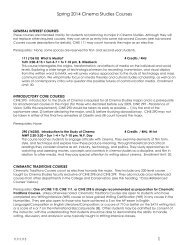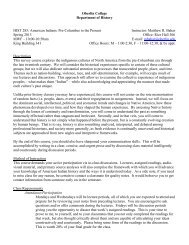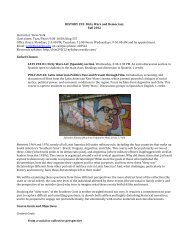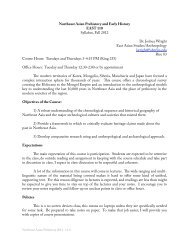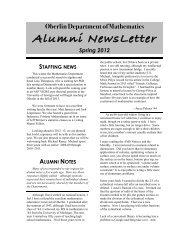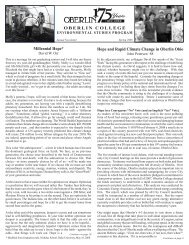Against the Current: Sita and Her Foils in - Bad Request
Against the Current: Sita and Her Foils in - Bad Request
Against the Current: Sita and Her Foils in - Bad Request
You also want an ePaper? Increase the reach of your titles
YUMPU automatically turns print PDFs into web optimized ePapers that Google loves.
characters seem to leap across <strong>the</strong> centuries <strong>in</strong>to <strong>the</strong> present. Chalam’s dialogue is<br />
particularly gripp<strong>in</strong>g <strong>in</strong> “<strong>Sita</strong> Enters <strong>the</strong> Fire” (Agni Pravesham), a brief piece written ca.<br />
1935. 18 In it, Chalam imag<strong>in</strong>es a conversation between Rama <strong>and</strong> <strong>Sita</strong> as <strong>the</strong>y meet for<br />
<strong>the</strong> first time s<strong>in</strong>ce her imprisonment <strong>in</strong> Lanka. When <strong>the</strong>y beg<strong>in</strong> to speak, <strong>Sita</strong> expresses<br />
her joy at see<strong>in</strong>g her husb<strong>and</strong> aga<strong>in</strong> but by <strong>the</strong> end, <strong>Sita</strong> has become so disillusioned that<br />
she throws herself <strong>in</strong>to Ravana’s funeral pyre. In contemporiz<strong>in</strong>g <strong>Sita</strong>, Chalam gives her<br />
words that free her from <strong>the</strong> constra<strong>in</strong><strong>in</strong>g semantics of dharmashastra.<br />
Many critics have objected to <strong>Sita</strong>’s acquiescence when Rama mistreated her. For<br />
example, B<strong>in</strong>a Agarwal’s English poem “<strong>Sita</strong> Speak,” which appeared <strong>in</strong> Indian Express,<br />
refers to several key moments at which <strong>Sita</strong> rema<strong>in</strong>ed mute, <strong>and</strong> <strong>the</strong>n asks “[H]ow did<br />
<strong>the</strong>y silence you?” 19 Such questions appear <strong>in</strong> regional language writ<strong>in</strong>g as well as <strong>in</strong><br />
English. For example, each stanza <strong>in</strong> award-w<strong>in</strong>n<strong>in</strong>g Kannada writer Vijaya Dabbe’s<br />
poem ends with “<strong>Sita</strong>, why didn’t you speak?” 20 Yet back <strong>in</strong> 1924, Chalam had already<br />
furnished <strong>Sita</strong> with words that enabled her to contest Rama’s patriarchal arguments.<br />
In “<strong>Sita</strong> Enters <strong>the</strong> Fire,” an example of such term<strong>in</strong>ology appears <strong>in</strong> a rapid-fire<br />
set of exchanges prompted by Rama’s refusal to accept <strong>Sita</strong> back because some of his<br />
citizens suspect her sexual purity because she lived with<strong>in</strong> <strong>the</strong> prec<strong>in</strong>cts of Ravana’s<br />
household. <strong>Sita</strong>, who ab<strong>and</strong>oned <strong>the</strong> comforts of <strong>the</strong> palace to accompany Rama <strong>in</strong>to<br />
exile, asks him to renounce his k<strong>in</strong>gdom so he need not conform to such public op<strong>in</strong>ion.<br />
Their exchange rests upon a tug of war over “rights” (hakku, plural hakkulu):<br />
Ramu: My dharma is to be k<strong>in</strong>g. And it is my hakku.<br />
<strong>Sita</strong>: You have dharma <strong>and</strong> hakkulu. But what about me? You have <strong>the</strong> hakku to<br />
claim me <strong>and</strong> to reject me. Why don’t you give up your hakku for my good?<br />
12



